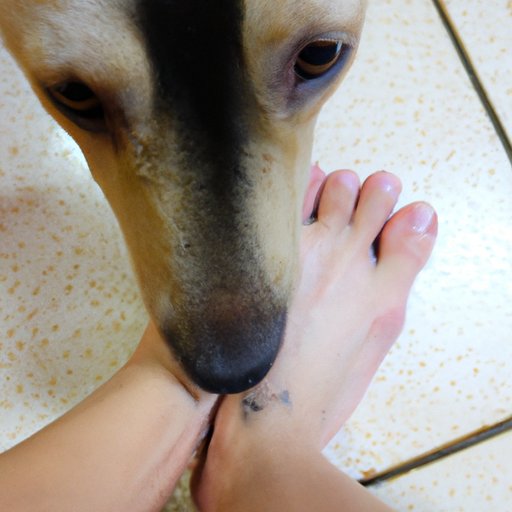
I. Introduction
Ringworm is a fungal infection that can affect both humans and dogs. Despite its name, the condition is caused by a type of fungus, not a worm. It can cause itchy, red, and scaly patches on the skin. In this article, we will explore whether you can get ringworm from your dog, debunk common myths about the condition, and discuss prevention strategies.
II. Everything You Need to Know About Ringworm from Dogs
Ringworm is spread through direct contact with an infected person or animal. Dogs can contract ringworm through contact with infected soil or animals, and sometimes even humans. Various types of fungi can cause ringworm in dogs, with the most common being Microsporum Canis and Trichophyton Mentagrophytes. Symptoms in dogs include circular patches of hair loss, broken hair, and scaly skin. It’s important to seek veterinary care if your dog shows signs of infection, as left untreated, it can cause serious health issues.
III. Can Dogs Really Give You Ringworm? The Myths and Facts Explained
There are several myths about getting ringworm from dogs. One is that all dogs carry the fungus that causes ringworm. This couldn’t be further from the truth! While ringworm is common amongst dogs, the majority of them don’t have it. Another common myth is that only certain breeds can get ringworm. Any dog breed can contract the infection. It’s also not true that humans cannot get ringworm from dogs. However, the risk is relatively low, with young children and individuals with weakened immune systems being the most susceptible.
If you suspect you have a ringworm infection, seek medical advice immediately. Your healthcare professional will likely recommend antifungal creams or medications like lotions or shampoos to treat the infection. It’s best to confirm your medications with experts before starting any medications.
IV. Preventing Ringworm Infections From Your Dog: Tips and Tricks
Prevention is key when it comes to ringworm. Regular grooming practices, like bathing and brushing, can help keep your dog’s coat healthy and free of infection. Good hand hygiene is also crucial, especially after handling your pet. Avoid sharing towels or other personal items with your dog, and keep your living space clean by regularly washing bedding and vacuuming carpets. If you suspect your dog has ringworm, separate them from other animals and people until you can take them to the vet. And, if your dog has ringworm, it’s important to finish the entire course of treatment prescribed by your vet to ensure it doesn’t return.
V. The Dangers of Ringworm: How Your Dog can Affect Your Family’s Health
Ringworm isn’t just a nuisance; it can also pose serious health risks, particularly to vulnerable populations, such as young children and individuals with compromised immune systems. If left untreated, it can cause severe infections that can take time to heal. In some cases, ringworm can lead to secondary, more severe infections, which can lead to serious health problems.
If your dog has ringworm, it’s essential to seek veterinary care immediately, particularly as the condition can easily spread to other pets and humans. Proper hygiene practices and prompt treatment can help prevent the spread of the infection and keep your family and pets healthy.
VI. Ringworm: The Invisible Yet Dangerous Threat Lurking in Dogs and Humans
Ringworm is a serious condition that requires attention and care. Prevention is key, so make sure to practice good grooming and hygiene habits. Be wary of myths and misconceptions about the condition, and seek medical advice if you suspect you or your pet may be infected. With the right care and treatment, ringworm is a condition that can be managed and resolved.
VII. Conclusion
Ringworm is a fungal infection that can impact both humans and dogs. While the risk of getting ringworm from your dog is relatively low, proper prevention and hygiene practices are essential in keeping it at bay. If you suspect your dog has gotten ringworm, don’t panic. Schedule a vet appointment, follow their treatment plan, and keep your dog separate from other animals and humans until they’re no longer contagious. By taking a proactive approach, you can protect your family and pets from the dangers of ringworm.





